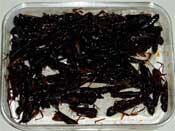ROME, ITALY: Beetles, caterpillars and wasps could supplement diets around the world as an environmentally friendly food source if only Western consumers could get over their "disgust", the UN's Food and Agriculture Organisation (FAO) said on Monday, 13 May 2013.

Cooked locusts (Image: Wiki Images)
"The main message is really: 'Eat insects'", Eva Mueller, director of forest economics at the FAO, told a press conference in Rome. "Insects are abundant and they are a valuable source of protein and minerals," she said.
"Two billion people, a third of the world's population, are already eating insects because they are delicious and nutritious," she said.
Also speaking at the press conference was Gabon Forestry Minister Gabriel Tchango who said: "Insect consumption is part of our daily life."
He said some insects, like beetle larvae and grilled termites, were delicacies.
"Insects contribute about 10% of animal protein consumed by the population," he said.
The report said insect farming was "one of the many ways to address food and feed insecurity".
"Insects are everywhere and they reproduce quickly, and they have high growth and feed conversion rates and a low environmental footprint," said the report, co-authored by the FAO and Wageningen University in the Netherlands.
But the authors admitted that "consumer disgust remains one of the largest barriers to the adoption of insects as viable sources of protein in many Western countries".
It suggested that the food industry could help in "raising the status of insects" by including them in recipes and putting them on restaurant menus.
The report also called for wider use of insects as feed for livestock, saying that poor regulation and under-investment currently meant it "cannot compete" with traditional sources of feed.
"The use of insects on a large scale as a feed ingredient is technically feasible, and established companies in various parts of the world are already leading the way," it added, highlighting in particular producers in China, South Africa, Spain and the United States.
"Insects can supplement traditional feed sources such as soy, maize, grains and fishmeal," it said, adding that the ones with most potential were larvae of the black soldier fly, the common housefly and the yellow mealworm.
The report also said the insects most commonly consumed by humans are beetles (31%), caterpillars (18%) and bees, wasps and ants (14%), followed by grasshoppers, locusts and crickets (13%).
It said trade in insects was thriving in cities such as Bangkok and Kinshasa and that a similar culture of insect consumption, entomophagy, should be established elsewhere, stressing that it was often cheaper to farm insects.
The report concluded: "History has shown that dietary patterns can change quickly, particularly in a globalised world. The rapid acceptance of raw fish in the form of sushi is a good example."
Source: AFP































